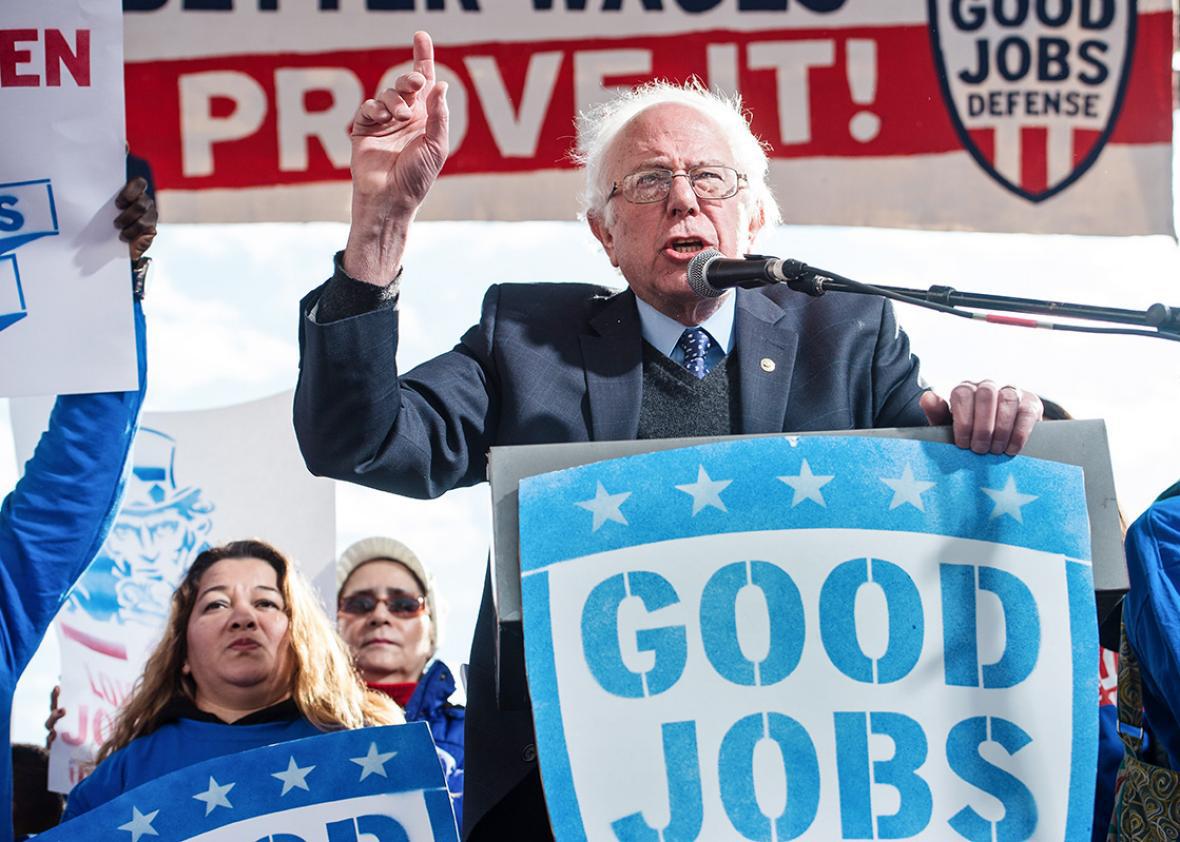Republican chatter about privatizing Medicare has put a spring in congressional Democrats’ step. No, they won’t tell you they’re excited about the prospect a campaign to privatize Medicare. “This is unfortunate,” Democratic Minority Leader Nancy Pelosi said Wednesday morning of the terribly tragic possibility that the Republican Party might go out of its way to commit suicide. “We wish the fight would go away, and they would just face the facts instead of instituting an ideological right-wing agenda that is called the Ryan budget.”
Pelosi was speaking at a “Hands Off Medicare” press conference on Capitol Hill, alongside Senate Minority Leader Chuck Schumer, Vermont Sen. Bernie Sanders, Illinois Rep. Jan Schakowsky, and others, including representatives from various liberal and pro-Medicare interest groups. Stacks of file boxes, marked with names like Social Security Works, National Nurses United, and MoveOn, straddled the dais. Together they allegedly contained more than 1 million signatures instructing House Speaker Paul Ryan and Senate Majority Leader Mitch McConnell to keep their “hands off Medicare.”
“Every senior, and every one of their children in America, should hear this loudly and clearly: Democrats will not let them win this fight,” an especially game Schumer said. “I say it to my Republican colleagues: Turn back, because we will fight you on this tooth and nail. We will win, you will lose. Turn back before it’s too late.”
Schumer described the Republican agenda as a “war on seniors.” It was one of several uncreative zingers, a staple of Democratic messaging. Others included renaming Paul Ryan’s “Better Way” agenda “Bitter Day,” while “the Price is wrong” was employed to describe Donald Trump’s selection for Health and Human Services secretary. Another Democratic tradition on display: brief oh-by-the-ways about the imminent destruction of Medicaid, the protection of which has never been as politically lucrative in messaging as it has been for Medicare. (Pelosi mentioned that one reason Medicaid is important is because of the number of seniors it covers.) California Rep. Tony Cárdenas cried when speaking about the importance of Medicare.
Schumer’s unequivocal confidence that Democrats had a sure winner here seemed to belie his wish that his Republicans colleagues would turn back. He was one of several speakers who analogized this prospective fight to Democrats’ 2005–06 defeat of President Bush’s plan to privatize Social Security. Schakowsky noted that Republicans didn’t just lose that fight—they lost both houses of Congress in the ensuing midterm elections.
“This is a winning issue” for Democrats, she said. She’s right, of course. Protecting Medicare and Social Security are a popular issue for everyone, because seniors (“voters”) love their entitlements. Trump recognized this during the campaign, or at least recognized this as an issue he could use to distance himself from the Republican establishment, and he was careful not to say anything about entitlement reform. But soon he’ll be in power as the head of a party that’s ideologically opposed to Medicare as we know it. Where once the idea was to hang Trump around the Republican Party’s neck, the Democratic strategy now is all about hanging Republican ideology around Trump’s neck.
Schumer had other reasons for being in a sporting mood. He knows the Medicare fight would fit in perfectly with his strategy to “align with Trump”—and prove it to be smarter than liberals originally reckoned it.
His “surprising” strategy, as the New York Times reported in mid-November, was to look “for ways they can work with Mr. Trump and force Republican leaders to choose between their new president and their small-government, free-market principles.” Critics pointed out that Democrats should be following the model popularized in 2009 by McConnell, of wholesale resistance to the new president’s agenda, rather than looking for areas of common agreement that might only boost Trump’s popularity. These critiques may have taken Democrats’ strategy a little too much at face value: They already recognized that congressional Republicans would “choose” to fulfill their long-bottlenecked policy agenda.
“During the campaign, President-elect Trump promised to save Medicare, Medicaid, and Social Security,” Schumer said. “He even made it explicit that he disagreed with most Republicans and his party on these … safety net programs. He even criticized them for their position. That was then, this is now.”
Sanders read the exact quote. “Let me begin with a quote made by a Republican candidate for president, a candidate who reached out to working people and who reached out to senior citizens,” Sanders said. “During the campaign, this is what that Republican candidate said: ‘I am not going to cut Social Security like every other Republican, and I’m not going to cut Medicare or Medicaid. Every other Republican is going to cut them.’ Mr. Trump, we are going to hold you accountable. … Millions of us are going to demand that you keep your promise.” Schakowsky read the same quote a few minutes later. Florida Rep. Ted Deutch didn’t just pressure Trump with his own campaign rhetoric. He approvingly read a tweet of Ann Coulter’s: “Medicare IS NOT WHAT THE ELECTION WAS FOUGHT OVER.”
“Finally,” Deutch said, “there is something we agree on.”
Democratic leaders aren’t talking about “aligning” with Trump because they’re itching to saddle up with the hot new thing on Pennsylvania Avenue. They’re doing it because they know congressional Republicans will dictate much of the policy agenda. When Bernie Sanders or Chuck Schumer says they want to give Trump the opportunity to fulfill his promises to workers, they have a good idea of what the answer will be.
